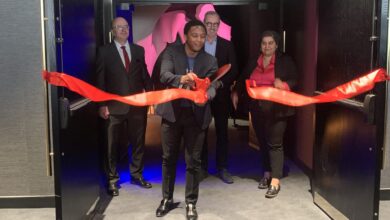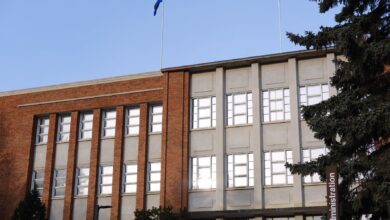2022 FoMD Lifesaver Debate: Medical Hunger Games
The debate brought a diverse set of faculty members together in a competitive battle of academic wit.
 Supplied
SuppliedIn the faculty of medicine and dentistry’s event, six contestants went head to head in the modernized medical Hunger Games. One hour. One winner. One coveted Lifesaver Flotation Ring Trophy. The informative and entertaining debate brought faculty members together in a competitive battle of academic wit.
This event provided attendees with an imaginary scenario: a catastrophic event has wiped out most of humanity and the survivors — the audience — must set sail to rebuild society. Only one final seat remained on the life raft and six members in the faculty of medicine and dentistry argued that their discipline was the one indispensable area of study that the new civilization needs to survive.
This year’s competitors included:
- Dr. Shereen Hamza, who specializes in physiology.
- Dr. Darryl Rolfson, who specializes in geriatrics.
- Dr. Blaine Aucoin, who specializes in dentistry.
- Dr. Lynora Saxinger, who specializes in infectious disease.
- Dr. Eniola Salami, who specializes in family medicine.
- Dr. Keith Rourke, who specializes in urology.
The event was hosted by Dr. Melanie Lewis, who works in pediatrics.
The debate opened with Dr. Hamza, who argued that physiology “integrates functions of cells, tissues, and organs into the human body,” and is the anchor for many of the medical sciences. Physiology is “essential for diagnoses,” and Dr. Hamza claimed she could help boost morale and as she “understand[s] the mind-body connection.”
Next to speak was Dr. Rolfson, who decided to rely on his Scout Leader experience and wilderness skills rather than his knowledge as a geriatrician.
He reasoned that everyone would “eventually become” elderly, and would need “laxatives, and home care,” which he would provide. This brought up the question: if we were all on a raft trying to rebuild society, would there be any home care, or a pharmacy? Dr. Rolfson heavily relied on his humour and today’s society within his argument.
Dr. Aucoin was up next, who argued that dentistry involved a “basic understanding of body functions,” and dentists needed to be able to “repair and fix” things on the fly.
Similar to Dr. Rolfson, Dr. Aucoin relied on his personal experiences as well as his degree in dentistry. He said he was fit for the job because he has “lived shipwrecked,” before, and to get through it it’s necessary to “focus on the good things that happened… Let’s get better.”
Following up was Dr. Saxinger, who believed that infectious disease is “involved in many ‘fields’ in a hospital,” and is “non-organ based” which makes it easy to use the way of thinking involved on many different parts of the body. She described infectious disease as appreciating the “big picture, but looks at the small details.”
Next on the roster was Dr. Salami, who reasoned that family medicine is “cradle-to-grave care,” and is “best to train the rest of them,” as they are considered the “jack of all trades.”
She said that her job is not only medical, but “is asked a lot of random questions,” as people trust her and see her as an all-knowing being; this prepares her for being able to deal with problems in many different situations. She is “less detail oriented,” and looks at the overall picture.
Lastly is Dr. Rourke, who relied on statistics as his argument. He noted that “15 per cent of women are infertile,” and reasoned that he is necessary because “if you’re not reproducing, you’re not existing.” He works both as a “clinician and a surgeon” who has “work[ed] with all ages.”
This year’s audience chose Dr. Eniola Salami, who was crowned reigning champion and will return next year.
“You want that warm, fuzzy hug — you want your family doctors!” Dr. Salami said.




